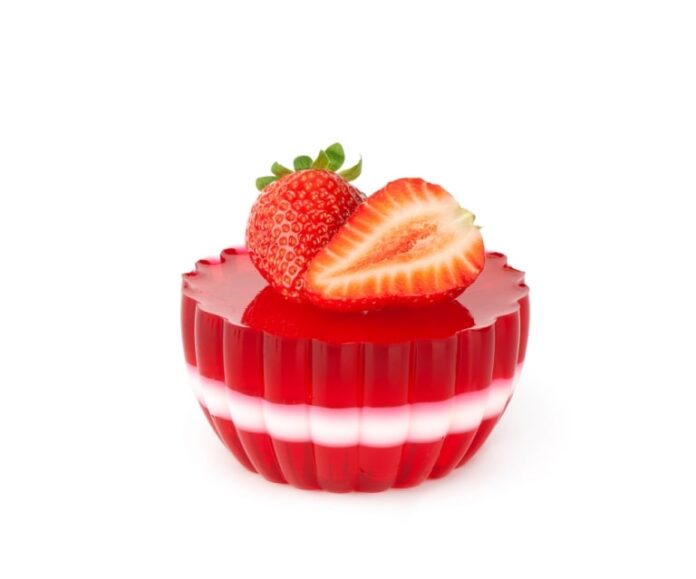When it comes to satisfying our sweet tooth, jelly has always been a favorite. However, those who follow a plant-based diet might wonder: is jelly vegan? After all, similar products, like gummy bears, can contain animal-derived ingredients.
In this article, I’ll discuss why jelly isn’t vegan. I’ll also provide three vegan-friendly alternatives that’ll satisfy even the most discerning jelly enthusiast!
A condensed chronicle of jelly
Jelly, in all its fun and funky shapes, has been stealing the show at British parties since way back in the Tudor days.
Whether in a simple glass bowl or fancy geometric molds, it’s always been the star. But here’s a fun fact: they didn’t start adding gelatine (that’s what helps it hold those cool shapes) to the fruity, syrupy mix until the 18th century.
Is Jelly Vegan?
Generally, no; jelly isn’t vegan. That mainly has to do with gelatine, a flavorless animal-based product. Typically, the former is used as a thickening agent in various dishes, including jelly.
Now, you might wonder: where does gelatin come from? The short answer is any animal part with collagen. That includes animal bones, skin, and cartilage.
Manufacturers boil those organs and tissues to extract the collagen. They then process the protein, turning it into a colorless jelly-like substance. As you can see, the entire process isn’t vegan-friendly.
Sure, you’ll find some vegan jelly options on the market. However, unless the label clearly states it doesn’t contain animal products, most likely, the jelly isn’t suitable for plant eaters.
Is There Any Vegan Jelly?
Yes! You can find plenty of vegan jellies at the store. Typically, those products contain gelatin alternatives. Among the most common substitutes are agar, carrageenan, vegan jel, and pectin.
You can use any of these options to make your version of this wobbly desert. Here’s a detailed explanation of each alternative:
1. Agar-Agar
Agar-agar is the plant version of gelation. This substance comes from the cell walls of some red algae.
To obtain this gelatin alternative, manufacturers boil the algae until it forms a gel. They then dry the liquid and further process it to form a powder.
Like gelatin, this plant’s jelly-like substance is colorless and tasteless. However, agar has a higher melting temperature, around 185ºF. Plus, it solidifies at around 104-113°F. So, your desert won’t be a wobbly mess at room temperature, unlike gelatin.
2. Carrageenan
Like agar-agar, Carrageenan is also a red algae product. The process involves cleaning and drying the seaweed. The marine plant then undergoes mechanical agitation in an alkaline solvent, filtration, and evaporation to obtain a powder.
Carrageenan is a thickening additive that’s commonly used in the food industry. That said, this plant gel has a lot of controversy. While it’s still FDA-approved, studies suggest carrageenan can cause several health issues. These include:
- Bloating and digestive problems
- Inflammation
- Colon cancer
- Allergies
- Arthritis
3. Vegan Jel
Vegan jel is most likely the closest alternative to gelatin. The former isn’t an ingredient by itself; it’s made of several plant-based products.
Now, the ingredients can vary from one product to another. However, generally, vegetable gum is the primary component that gives vegan jel its thickening action.
Other ingredients include tapioca dextrin. Basically, the former is starch that comes from tapioca roots. When dissolved in water, the sugar compound acts as a glue.
Like all plant-based products on this list, vegan jel is also flavorless. However, what makes the latter product an ideal alternative to gelatin is its low melting point.
So, unlike agar, you don’t need to boil water and stir frequently to dissolve it. Simply mix the powder with cold water and add it to your recipe. You can use it in all dishes that require gelatin. The best part is that vegan jel sets softly, giving you the same texture as animal-based jelly.
Wrapping Up
Is jelly vegan? This is a question many dessert lovers ask. Unfortunately, traditional jelly isn’t vegan. It contains gelatin, an animal-based thickening agent.
But fear not! You can use vegan-friendly alternatives like agar-agar, carrageenan, and vegan jel to make jelly. Out of those options, the latter provides the closest results to gelatin.
Regardless of the plant-based product you choose, all the alternatives allow you to enjoy the wobbly dessert without compromising your dietary choices!
